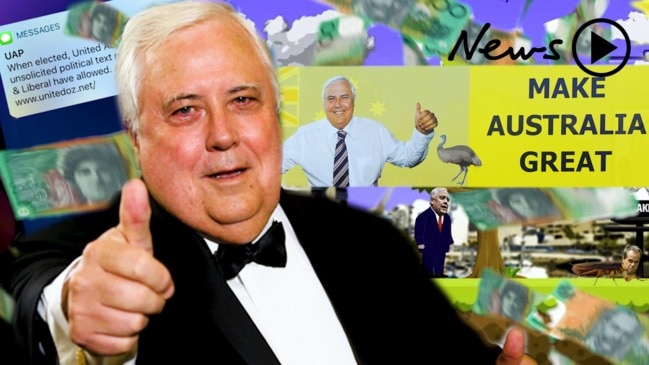With Palmer preference, it’s ‘Chaos and Dysfunction 2.0’
The election is no longer just about Scott Morrison versus Bill Shorten, writes Dennis Atkins. The Coalition giving Clive Palmer preferences now allows Labor to paint a picture of titanic dysfunction.

Scott Morrison thinks he’s lucked on a clever compare and contrast line for the May 18 election.
“If you vote for the Coalition you get me as prime minister, if you vote Labor you get Bill Shorten as prime minister,” is the general tenor of his pitch.
It rides on Shorten’s consistently low approval/disapproval levels which stands nationally at minus 14 points and has been as low as minus 25.
RELATED: Follow or live election blog
This gives potency to any political play which uses Shorten as a point of comparison.
It’s why Labor’s painting itself as a big target, laying out lots of look over here policies.
They all carry a risk but it’s a whole lot better than running a campaign which has Shorten in a presidential match up.
Now that simple equation Morrison has been using has become more complicated.
If Morrison and his campaign team handle what’s happening badly those complications could turn into a political Gordian knot.
MORE FROM DENNIS ATKINS: Can Clive’s money really buy him an election win?
All this is flowing from Morrison’s opportunistic hitching of his campaign wagon to Queensland worker short changer Clive Palmer.
Boiled down, the Coalition will give Palmer preferences in senate races in exchange for the same in key marginal seats, which would otherwise fall to Labor.

This will allow Labor to run a line back at Morrison that if people vote for the Coalition they will give Palmer the balance of power in the senate.
Under this scenario, the election is no longer just about Morrison versus Shorten but it also allows Labor to paint a picture of Chaos and Dysfunction 2.0.
With Palmer holding a potential balance of power role in the Senate, everything is uncertain and “good government” is a distant dream.
As we saw yesterday, Morrison will dance through the raindrops, trying to stay dry.
Here are his responses: it’s a matter for party officials, there are no discussions involving policy and, if there’s a sharper distinction involving the Nationals, he passes the ball to his Coalition partner.
MORE FROM DENNIS ATKINS: Federal election 2019: Politicians? They don’t give a toss about us
These deflections work as far as they go but there are quite recent real world examples of the downside in getting too close to a political figure with more baggage than a Samsonite warehouse.

At the last Queensland state election, Labor was able to deflect from what was, at best, grudging support for the Palaszczuk Government by making it a contest between the ALP and Pauline Hanson’s One Nation.
There was a risk of feeding ON votes over to the LNP, especially after the late switch on voting policy from optional preferential to a compulsory preferential system.
Luckily for Labor, the LNP handled the ON issue so badly they lost coming and going, not getting enough primary or preferential support in the regions and losing out directly in seats in the greater metropolitan Brisbane area.
The result was a minority Palaszczuk Labor government winning enough seats to become a majority operation.
The other piece of field evidence is the early 2017 Western Australia election where a political newcomer in leader Mark McGowan led his team to the biggest ALP win on record, taking 41 of the 59 seats.
MORE FROM DENNIS ATKINS: A gay, married, Arabic speaking Christian could topple Trump
The analysis of this outcome is a Liberal government preference deal with ON — getting support in the lower house for Liberal backing in the Legislative Council — backfired big time.
The Liberals lost out big time while ON prospered, picking up three upper house spots.
The man who felt that defeat most severely, former Premier Colin Barnett, has spoken out warning Morrison from doing a deal with Palmer, saying it had every chance of backfiring as he had seen first hand two years ago.

Barnett also warns of blowback from China if there’s a deal with Palmer, pointing out the Queensland businessman is as unpopular in Beijing as he is in Townsville.
This allows us to chart a number of paths the election may follow.
Perhaps the most likely is the Coalition preference deal with Palmer plays out in a WA fashion with a serious blowback against Liberal MPs and candidates in metropolitan electorates, no real net benefit in the regions and some big wins for the Queenslander in the Senate.
It is not crazy to surmise Palmer might get between three and seven Senate seats — as many as two in Queensland and one each in New South Wales, Victoria, Western Australia, Tasmania and South Australia.
That’s clearly the high water mark but it’s in the realm of possibility because of the low regard for mainstream parties and Palmer’s hefty ad buy in all states.
No one can say they weren’t warned.
Dennis Atkins is The Courier-Mail’s national affairs editor.
Don’t miss Dennis Atkins and Malcolm Farr’s politics podcast Two Grumpy Hacks, available free on iTunes or Soundcloud.


